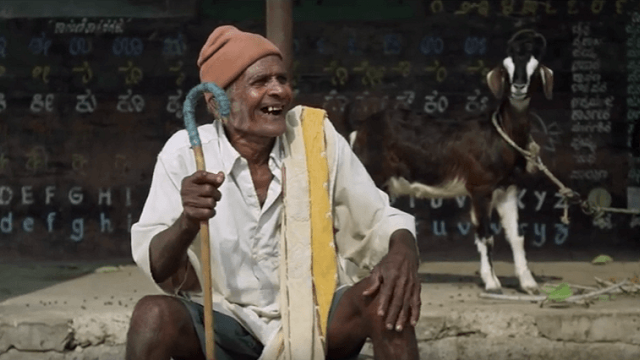Century Gowda is a crotchety old man. At 101 years old, he’s the oldest man in his tiny Indian village who spends his days verbally harassing everybody who happens to walk in front of him. He shouts at women taking the cows to graze, at a man buying a snack at the store, and at schoolkids going out for a field trip. Nothing good can last forever, and he dies taking a shit in the alley.
A thithi is this culture’s version of a wake, a funeral, and sitting shiva. It’s a ritualistic banquet to celebrate and mourn the passing of a cultural mainstay, with many elements to be conducted by the eldest son. Too bad Century’s eldest son, Gadappa, has long since rejected his family and culture. Where Century observed from a stoop in the town square, Gadappa roams the country like an old hippy, stealing money from other farmers and hanging out with wandering groups of miscreants.
The cycle continues in Gadappa’s son, Thammanna, a failing family man who blames everybody for his own failings. He cheaps out on farm equipment, and so he can’t make money from his farming. He has his sights on selling Century’s family land to make ends meet, but land transfers to the eldest son and Gadappa doesn’t give two shits about anything capitalistic. Meanwhile, he has to provide the food for Century’s thithi but is dirt broke. Schemes abound.
We like to think of cultures in a bubble, but the small village in Karnataka is a blend of old and new culture. Thammanna’s son makes money by manually pulling up sand with a pan, but he still looks at porn on his cell phone. Gadappa plays what looks like a version of Chinese checkers with the schoolkids using chalk and rocks, but drinks alcohol from plastic containers. Thammanna needs to fix the motor on a piece of irrigation equipment to grow his drying sugar cane. Thammanna’s son uses his motorbike to personally deliver all the notices about Century’s thithi. Old culture and modern culture intersect in the most fascinating of manners.
Ultimately Thithi is about cycles of life, patterns of behavior, generational influences, and tradition in the face of modernization. There are hints of Death at a Funeral and The Gods Must Be Crazy peppering this version of the “Daddy’s Dyin’ Who’s Got The Will?” storyline. Using a bunch of non-actors from the countryside, Thithi has a strange feeling of earnest authenticity that borders becoming an amateur production. The cinematography, however, is vibrant and electric, further emphasizing the culture clash between tradition and modernization.
Honestly, the characters here are what really make the film. Each of the family generations are fleshed out with their own methods of passing time, dealing with life, and otherwise trying to survive. They’re all flawed in such humane manners. Even if they’re acting like assholes, they’re realistic assholes and not caricatures of assholes. But, Thithi doesn’t judge. It’s cool. Everything will be just fine…


